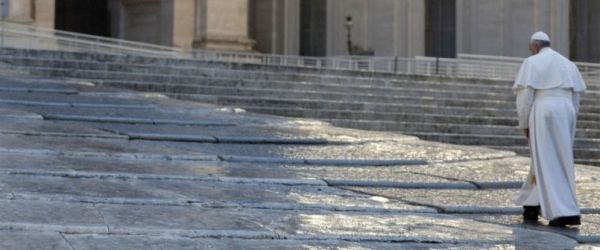The Gospel parable which we have just heard (cf. Lk 18:1-8) contains an important teaching: we “ought always to pray and not lose heart” (v. 1). This means, then, pray constantly, not just when I feel like it. No, Jesus says that we ought “always to pray and not lose heart”. And he offers the example of the widow and the judge.
The judge is a powerful person, called to issue judgment on the basis of the Law of Moses. That is why the biblical tradition recommended that judges be people who fear God, who are worthy of faith, impartial and incorruptible (cf. Ex 18:21). However, this judge “neither feared God nor regarded man” (Lk 18:2). As a judge, he was unfair, unscrupulous, who did not take the Law into account but did whatever he wanted, according to his own interests. It was to him that a widow turned for justice. Widows, along with orphans and foreigners, were the most vulnerable groups of society. The rights afforded them by the Law could be easily disregarded because, being isolated and defenceless, they could hardly be assertive. A poor widow, there, alone, with no one to defend her, might be ignored, might even be denied justice. Just as the orphan, just as the foreigner, the migrant: in that time this was a very serious problem. Faced with the judge’s indifference, the widow has recourse to her only weapon: to bother him incessantly with her request for justice. And because of her insistence, she achieves her end. At a certain point, the judge grants her request, not because he is moved by mercy or because his conscience has been working on him; he simply admits: “because this widow bothers me, I will vindicate her, or she will wear me out by her continual coming” (v. 5).
From this parable Jesus draws two conclusions: if the widow could manage to bend the dishonest judge with her incessant requests, how much more will God, who is the good and just Father, “vindicate his elect, who cry to him day and night”; moreover, will not “delay long over them”, but will act “speedily” (vv. 7-8).
That is why Jesus urges us to pray and “not to lose heart”. We all go through times of tiredness and discouragement, especially when our prayers seem ineffective. But Jesus assures us: unlike the dishonest judge, God promptly answers his children, even though this doesn’t mean he will necessarily do it when and how we would like. Prayer does not work like a magic wand! It helps us keep faith in God, and to entrust ourselves to him even when we do not understand his will. In this, Jesus himself — who prayed constantly! — is our model. The Letter to the Hebrews reminds us that “In the days of his flesh, Jesus offered up prayers and supplications, with loud cries and tears, to him [God] who was able to save him from death, and he was heard for his godly fear” (5:7). At first glance this statement seems far-fetched, because Jesus died on the Cross. Yet, the Letter to the Hebrews makes no mistake: God has indeed saved Jesus from death by giving him complete victory over it, but the path to that [victory] is through death itself! The supplication that God has answered referred to Jesus’ prayer in Gethsemane. Assailed by looming anguish, Jesus prays to the Father to deliver him of this bitter cup of the Passion, but his prayer is pervaded by trust in the Father and he entrusts himself entirely to his will: “not as I will,” Jesus says, “but as thou wilt” (Mt 26:39). The object of prayer is of secondary importance; what matters above all is his relationship with the Father. This is what prayer does: it transforms the desire and models it according to the will of God, whatever that may be, because the one who prays aspires first of all to union with God, who is merciful Love.
The parable ends with a question: “when the Son of man comes, will he find faith on earth?” (v. 8). And with this question we are all warned: we must not cease to pray, even if left unanswered. It is prayer that conserves the faith, with out it faith falters! Let us ask the Lord for a faith that is incessant prayer, persevering, like that of the widow in the parable, a faith that nourishes our desire for his coming. And in prayer let us experience that compassion of God, who like a Father comes to encounter his children, full of merciful love.
[Pope Francis, General Audience, 25 May 2016]












